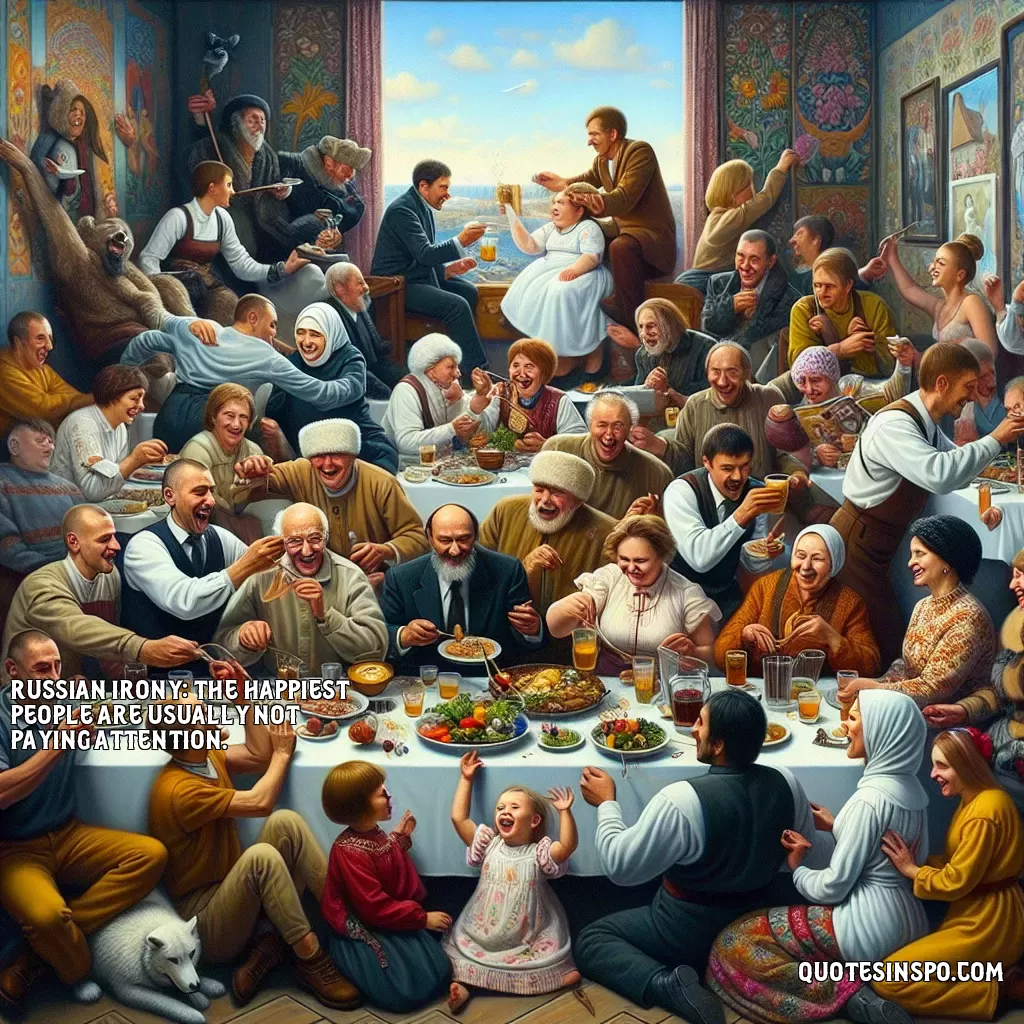
Russian Irony: The happiest people are usually not paying attention.

Russian Irony: The happiest people are usually not paying attention.
The quote "Russian Irony: The happiest people are usually not paying attention" suggests a paradoxical observation about happiness and awareness. It implies that those who are truly happy may not be deeply aware of the problems, complexities, or unpleasant aspects of life. This idea resonates with the common saying "ignorance is bliss," indicating that happiness can sometimes stem from a lack of awareness or concern about the struggles and issues that pervade daily life. In this context, "Russian Irony" can suggest a cultural or philosophical perspective often attributed to Russian literature and thought. Russian writers like Fyodor Dostoevsky and Leo Tolstoy frequently explored the depths of human consciousness, illustrating how increased awareness and introspection can lead to existential questioning and unease. This irony points to the tension between happiness and awareness; perhaps, those who notice and ponder every detail and problem in life find it harder to maintain happiness due to the weight of understanding and caring about these issues. Conversely, those who are less attentive or choose to overlook certain realities may find it easier to exist in a state of bliss. Their focus may be more immediate—centered on simple pleasures and daily joys—rather than burdened by existential considerations. Therefore, the quote humorously suggests that inattention might be a key ingredient to happiness. It's not to say that ignorance is an ideal state, but rather it questions the complexity and full awareness that might sometimes be accompanied by discontent. Moreover, the notion of happiness as it relates to attention can lead one to ponder the values we prioritize and the ways we process information. In a world where information overload is common and constant awareness can be tiring, this quote invites reflection on whether selective attention could pave the way for a more fulfilled and happy life. This can also be seen as a critique of modern society, where being constantly plugged into news, social media, and global issues might make it harder to find contentment.
Quote By: Dmitry Glukhovsky
Dmitry Glukhovsky, born on June 12, 1979, in Moscow, Russia, is a celebrated author, journalist, and screenwriter, best known for his dystopian novels that have captivated readers around the world. Glukhovsky grew up during a transformative period in Russian history, which profoundly influenced his writing. He studied at Moscow State University, where he earned a degree in journalism, and later pursued a degree in history, which equipped him with a unique perspective on societal issues that permeate his literary works.
Glukhovsky's literary career took off with the publication of his debut novel, "Metro 2033," in 2002. Set in the post-apocalyptic tunnels of the Moscow Metro following a catastrophic nuclear event, the novel explores themes of survival, fear, and the human condition in dire circumstances. The book quickly gained popularity and recognition, leading to a cult following and inspiring a series of video games, further solidifying Glukhovsky's status as a prominent figure in both literature and entertainment. The success of "Metro 2033" established him as a master of speculative fiction and earned him accolades for his compelling storytelling and vivid world-building.
Following his initial success, Dmitry Glukhovsky continued to expand his literary portfolio with sequels like "Metro 2034" and "Metro 2035," each deepening the narrative and exploring the psychological impact of life in a world ravaged by war and radiation. In addition to the Metro series, Glukhovsky has authored several other notable works, including the novels "Futu.re" and "Text," where he delves into themes of technology, identity, and the future of humanity.
Glukhovsky's works have been translated into multiple languages, affording him international recognition. His ability to blend thought-provoking themes with gripping narratives speaks to his prowess as a writer. Beyond novels, Dmitry Glukhovsky has also worked in television and film, adapting his stories for the screen and contributing to various media projects. With his thought-provoking narratives and ability to reflect on contemporary social issues, Dmitry Glukhovsky has established himself as a pivotal voice in modern Russian literature.